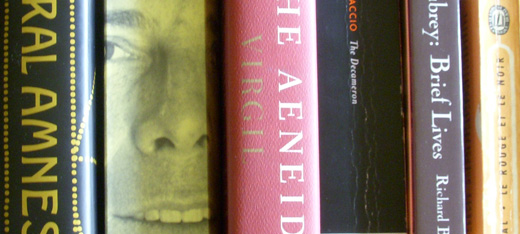Monday Morning Read
¶ In the Decameron, VIII, iii, a story funny enough to film, perhaps as a silent movie. Duped by his chums, Calandrino thinks that he has discovered stones of invisibility-granting heliotrope. He’s lovably loopy until he gets home, where he blames his he thinks sudden visibility on his wife and beats her up. It would be amusing to know the facts behind this anecdote. Calandrino, as the painter Nozzo di Perino was nicknamed, appears in three forthcoming tales as well. Nozzo’s simple-mindedness is presented as a kind of dim egoism.
¶ In the Aeneid, Aeneas goes on an avenging rampage, slaughtering with especial zeal those who beg for their lives. The whole sanguinary mess seems like some awful sadomasochistic orgy, conducted with real weapons.
¶ In Aubrey: Glover, Goddard, Goffe, Gunter (a Welsh name, from “Tregunter”), Hales, Hall, and Halley. Janus smiles on Goddard and Halley: Halley, one of Aubrey’s youngest subjects (he would live until 1742), stands for science-as-we-know-it, as his voyage to St Helena, undertaken for the sole purpose of mapping the southern sky, makes clear. As for Goddard, who was, among other things, Cromwell’s physician,
He was professor of medicine at Gresham College; where he lived and had his laboratory for chemistry. He was an admirable chemist.
He had three or four medicines wherewith he did all his cures; a great ingredient was serpent’s root. From Mr Michael Weeks, who looked after his stills.
Chemistry and alchemy jostle comfortably in Aubrey’s memoranda, as indeed they would continue to do until Lavoisier finally made a science of the one and exposed the other to the cruel light of day.
¶ In Le rouge et le noir, Julien falls asleep night after night while copying his Russian friend’s preposterous “love letters,” for dispatch to the Maréchale de Fervaques in the morning. Similarly, Stendhal seems to be falling asleep as he struggles to take an interest in his story.
¶ Summing up his dismissive essay on Walter Benjamin — one of the longer sustained pieces in Cultural Amnesia, Clive James writes, “None of this is pleasant to say, and is probably njot pleasant to hear.” I beg to differ. As someone who came of age when Benjamin was just being discovered at universities far more fashion-conscious than my own, I have always felt quizzical about Benjamin. His famous essay on the inertness of reproduced artworks strikes me as very wrong-headed, as reasonable as you please until you actually look at a good print of a famous painting. James’s essay is studded with delicious quotables, but surely the palm must go to this beaut:
For the half-educated Beatles-period junior intellectual intent on absorbing sociology, philosophy and cultural profundity all at once and in a tearing hurry, Benjamin’s scrappily available writings constituted and intellectual multivitamin pill, the more guaranteed in its efficacy by being so hard to swallow.
¶ Which coasts me easily to James Merrill:
After the child laughed, and the Emperor
Had been hurried back to the palace, he stood before
His mirror long enough to see that, yes,
He was indeed quite naked. What a mess.The children, more impressionable for all
Their accuracy, could not but recall
The solemn music before the Embarrassment,
And naked down the avenues they went.
(“Parable,” from “Four Little Poems”)

